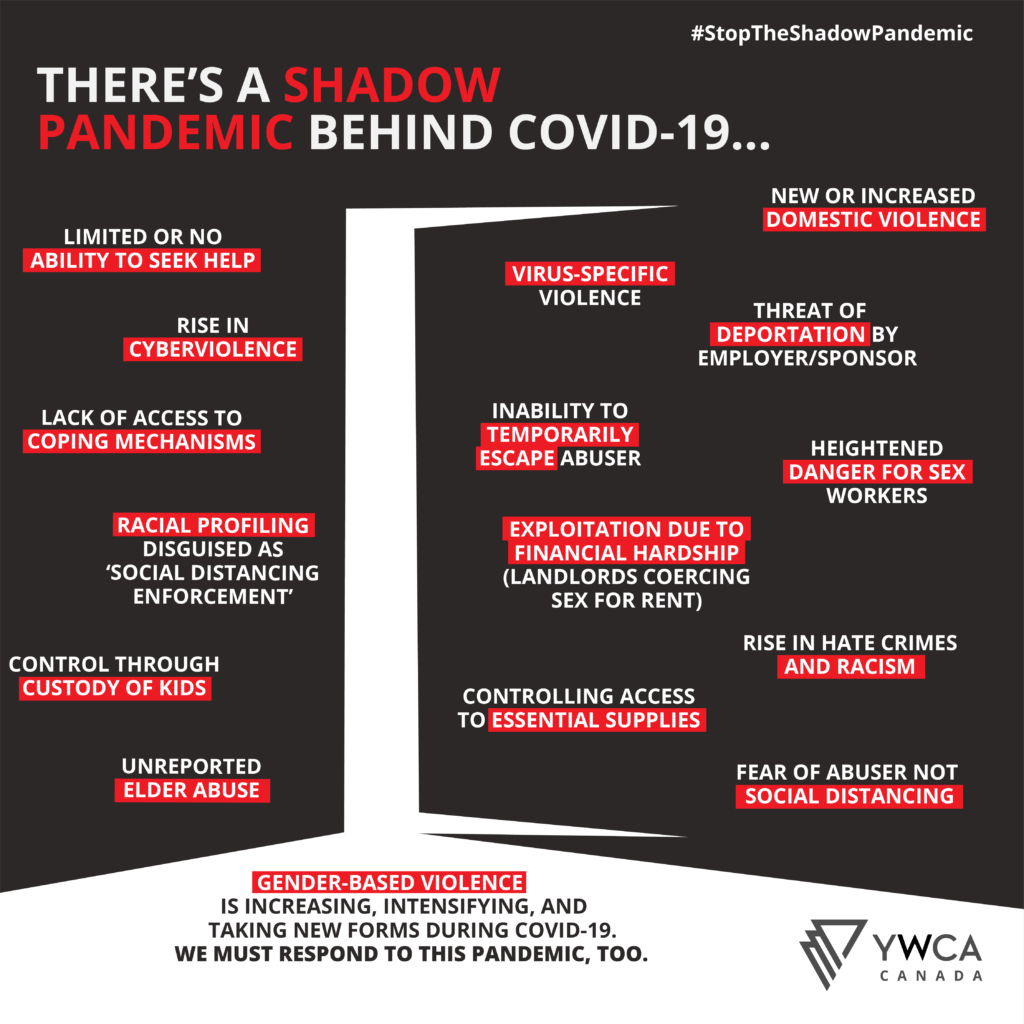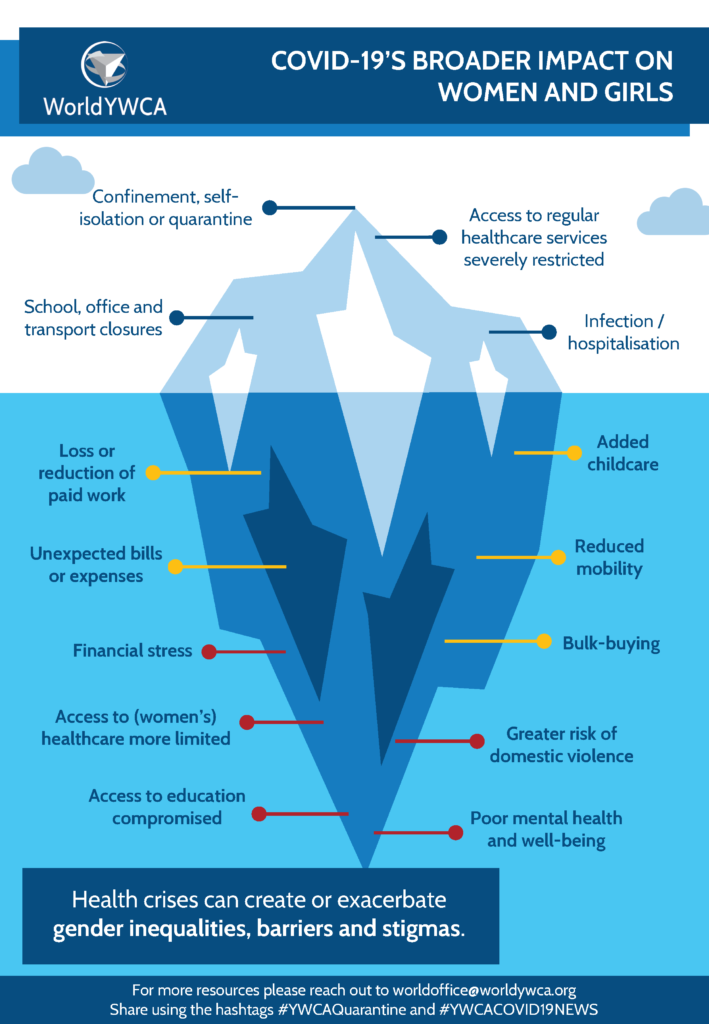On March 11th, the world fundamentally changed in Canada and beyond. It’s when the World Health Organization called COVID-19 a global pandemic.
Soon after, YWCA Canada started working on understanding the gendered economic, health and social impacts of the disease.
In addition to the scientific studies and investigative reporting, we sought out to hear from community members themselves across Canada from within and beyond the YWCA movement.
That interest led to the creation of YWCA Canada’s #GenderEquityDuringAPandemic virtual series. We’ve had 3 installments so far and have more in the works.
Be sure to check out videos and slides from our past sessions as well as sign up for our next one on June 17th!
- April 1st: Gendered Impacts of COVID-19 – An Online Town Hall
- April 30th: Community Responses to COVID-19
- May 7th: Care During A Pandemic
On June 17th at 5:30 pm ET, in partnership with LEAF, YWCA Canada will hold its next session on ‘Cybermisogyny in Times of COVID-19 and beyond’.
Register here before tickets run out: https://www.eventbrite.ca/e/cybermisogyny-in-times-of-covid-19-and-beyond-tickets-106639479554
Gender Equity During A Pandemic
So how exactly is this disease impacting women, girls, Two-Spirit and gender diverse people?
As our #GenderEquityDuringAPandemic virtual series has highlighted, we are seeing gendered impacts on every front.
First of all, women are front and centre in the pandemic response and over-represented in essential occupations as cleaners, grocery store clerks, nurses and service providers in the health and social services.
Not only that, the sectors they are over-represented in such as retail, food services, hospitality and tourism have been economically devastated by the global border closures and economic shutdowns. Within Canada, in March 2020, women represented 70% of all job losses in the core demographic aged 25 to 54 years. 1 in 5 women workers lost their jobs or the majority of their hours in February and March. In April 2020, there were 5.3 million women out of work compared to 3.4 million men.
On top of that, many women are experiencing a ‘triple duty’. With the shuttering of child care centres and school closures, many women in heterosexual dual-income households are tasked with both being worker and teacher, as well as taking on the lion’s share of household and unpaid care duties for both children and elders. This may be felt even more acutely in single-parent households.
In addition, we are seeing the rise of gender-based violence including domestic violence. As our #StopTheShadowPandemic infographic shows, such violence has not only heightened but taken on new and terrifying forms. This is the pandemic within the COVID-19 pandemic. We see this rise in domestic violence coupled with the ongoing affordable housing crisis leading to an increased usage of our YWCA shelters in some parts of the country.
This is just the tip of the ice-berg. Our colleagues at World YWCA have developed an infographic that shows some of the other gendered impacts of COVID-19 happening globally.
YWCAs Stepping Up and Doing More with Less
In times of crisis, service delivery organizations, like YWCAs across Canada, are often the first to respond and go to extraordinary measures to hold communities together. But with the cancellation of fundraising events, shrinking donations and new expenditures to meet public health measures like physical distancing and enhanced sanitation practices, YWCAs are forced to do more with less.
It’s not just the YWCA Canada federation. As the Canadian Women’s Foundation noted in their recent report ‘Resetting Normal: Building Gender Equality in the Pandemic Recovery’, we are seeing the broader gender equity sector struggle under the weight of this crisis. Not only that, the broader range of Canadian charities and non-profit organizations are at risk of mass extinction as IMAGINE Canada’s ongoing sector monitoring reports also show.
That’s why we have called on our elected officials to support the YWCA with a $2.8 million stabilization fund as well as advocating alongside fellow charities and non-profits calling for a broader sector stabilization fund of $10 billion dollars.
Be sure to join the call and take action:
- We need a Feminist Approach to COVID-19: https://ywcacanada.ca/take-action/act-now/emergency-covid-19-relief-funding/
- YWCA Canada needs Emergency Relief to Stop the Spread of COVID-19: https://ywcacanada.ca/take-action/act-now/emergency-covid-19-relief-funding/
A Gender-Responsive Approach to Recovery is Essential
Over 2 months have passed since our way of life in Canada has completely changed to address COVID-19. We have completely re-oriented our society to address the concerns this pandemic has brought to our forefront and we are starting to see policymakers, politicians and the public at large grapple with and commit to advancing gender equity.
However, this cannot be a short term commitment. We need longer-lasting action that will take many months and years to accomplish. This pandemic has offered us a window of hope – it’s put into sharp relief what really matters and where we should put our attention as a society.
That’s why YWCA Canada is calling for a gender-responsive approach to addressing the consequences of COVID-19. We must invest in the social infrastructure and public policies that will make a material and lasting impact on the lives of women, girls, Two Spirit and gender diverse people in Canada.
In June, YWCA Canada will be issuing our Feminist Recovery Plan calling for investments that put care, equity and intersectional feminism at the core of our post-pandemic recovery. This means deep and meaningful investments in the social determinants of health that foster thriving communities like affordable housing, decent working conditions and strong labour protections, income security, and freedom from interpersonal and systemic violence and oppression including stopping gender-based violence. It means building strong social infrastructure like accessible, affordable and high-quality early learning and child care for all. It also means robust, predictable and sustainable funding for the gender equity sector and broader civil society.
This initial offering won’t be an exhaustive list but will provide a clear direction to the Federal government and other sub-national jurisdictions that highlights you cannot recover from COVID-19 in any meaningful way without an intersectional gender-responsive lens. Fortunately, before the pandemic, we saw the Government of Canada take on measures such as passing the Canadian Gender Budgeting Act and starting the process of developing public policies through an intersectional Gender-Based Analysis (GBA+) lens. This will be an important foundation to draw on, approaches that cannot stop during a pandemic and what must guide our recovery as well. We’ve already seen jurisdictions such as the State of Hawaii’s Status of Women Commission put out their own Feminist Economic Recovery Plan.
The economic, health and social consequences of this crisis have been and will continue to be felt most acutely by women, girls, Two-Spirit and gender diverse people. So they must be the ones driving our efforts moving forward. Work with us to make a Feminist Recovery Plan a reality in Canada and join our movement to advance gender equity across the country.
Want to read more from our Gender Equity During A Pandemic work?
- Future of Good – A Feminist Approach to COVID-19 Recovery
- Public Policy Forum – Rebuilding Work as We Know It
- The Philanthropist – COVID-19 Disproportionate Impact on Women
A special note of gratitude to Jennifer Gammad Lockerby, teammate and co-facilitator of YWCA Canada’s #GenderEquityDuringAPandemic virtual series.
Anjum Sultana is the National Director of Public Policy & Strategic Communications at YWCA Canada.


